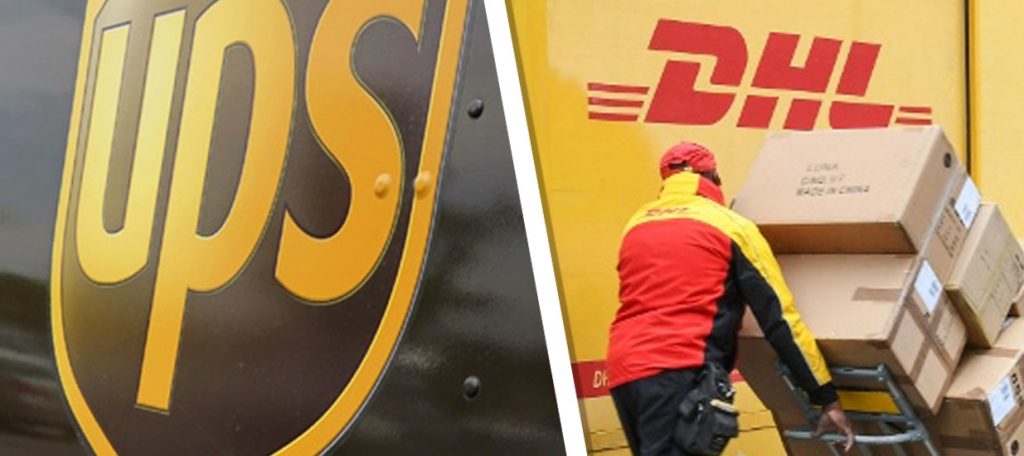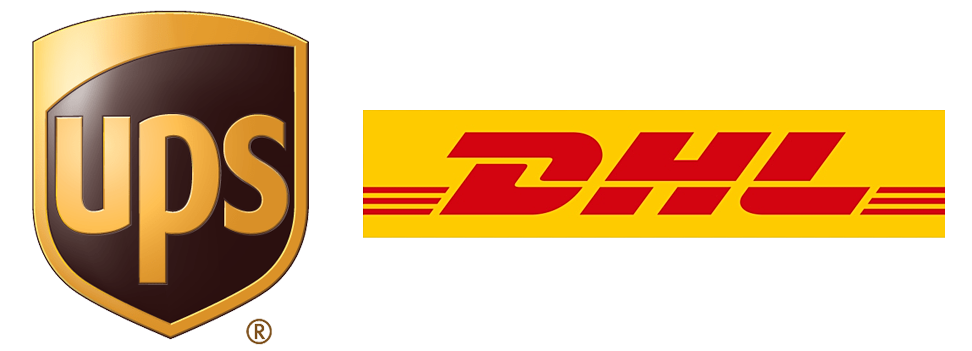EDI WITH UPS, DHL & CO


UPS logo; DHL logo
Electronic data exchange with CEP service providers such as UPS and DHL
Simplify your process workflows with UPS, DHL, etc.
In the context of a comprehensive EDI integration of logistics processes, the focus of digitization is initially on traditional freight forwarders and logistics providers. Particularly for production-related companies, the initial focus of electronic data interchange is on the transport and warehouse organization of the manufactured products: the sheer mass of production units alone lends itself to automated handling of the underlying processes for distributing the manufactured goods to the distributors.
Taking a holistic view of logistics processes, however, it quickly becomes clear that not only the distribution of mass represents an organizational challenge that needs to be optimized; the quantity factor offers even greater potential for optimization. Since the costs per transport unit generally increase with decreasing mass—leading to decreasing revenue—many companies are looking for an adequate means of realizing additional savings by digitizing high-volume shipping processes.
EDI integration of CEP service providers is becoming increasingly important
In recent years, this has more and more focused on the EDI integration of CEP service providers (courier, express, and parcel services) such as UPS, DHL, DPD, Hermes, and others. The shift of B2C business to the internet is forcing many companies to supply their end customers directly, traditionally through their own online store. Since the major retail chains are also increasingly running their own online stores, suppliers have an important role to play that should not be underestimated: although the products are sold via the retail companies’ online stores, the supplier must deliver the sold products directly to the end customer, handle complaints, and take over the entire organization of returns. The classic commercial process consisting of Order, Delivery note, and Invoice is the least of the problems. However, the handling of direct shipments, complaints and returns can only succeed by working with CEP service providers, as it often involves the shipment of individual products with low value-added potential. The producer thus assumes the role of a fulfillment service provider who must be able to successfully map all the processes involved at the lowest possible cost. This is only possible on the basis of automated process handling using EDI technologies.
Standardized EDI scenarios displace manufacturer-specific stand-alone solutions
In the search for automated process handling with the involved CEP service providers, the use of an isolation application has been propagated by the carrier to this day. However, these solutions offer only limited functionality to manually enter the desired transport orders including transport-specific data (dimensions, weight, etc.), to trigger the pickup process, and, if necessary, to ensure traceability of the shipment until delivery to the consignee. The decisive disadvantages of these isolated applications are the manual effort required for data entry, the lack of integration capability in the shipper’s ERP system, and the fact that these applications are manufacturer-specific and the shipper has to operate an individual application with different application logic for each service provider.
Since the vast majority of companies today operate with multiple service providers, a neutral solution based on automated EDI processes should be the goal of an intelligent CEP integration strategy. Today, the leading CEP service providers offer precisely a such as scenario.
EDI integration of UPS logistics
UPS is a prime example of a possible EDI integration scenario with CEP service providers. UPS already offers its customers a wide range of different EDI processes and formats, which can basically be divided into three areas:
In general, UPS separates EDI formats into the two categories EDI and XML. In this context, UPS understands EDI to mean both the transmission of EDI data in EDIFACT and in the American ANSI X.12 format. EDIFACT, ANSI X.12, and XML are, however, to be regarded merely as different EDI packaging variants which serve to transport the logistical process data via the communication channels offered (see below). Due to the American roots of UPS, many processes outside the mainstream are mainly offered in the American ANSI X.12 standard. For a deeper integration of logistics processes with UPS, users should therefore make sure that the EDI solution used allows the trouble-free use of ANSI X.12 formats from both a technical and a commercial point of view.
EDI logistics with DHL
As the second major CEP service provider alongside UPS, DHL also offers a range of logistics processes that can be automated using EDI. On the company’s own portal, customers can register for the XML web services and EDI solutions for data exchange with DHL and request all necessary information.
DHL relies primarily on the use of EDIFACT formats as a tried and tested means of EDI data exchange:
DPD with own converter for DPD standard formats
When it comes to EDI process integration of CEP service providers, UPS and DHL are pioneers; other providers usually offer only rudimentary options for digitizing logistics processes using EDI technology. Often proprietary ASCII formats are used to this end. DPD, for example, uses DPD standard formats for this purpose, such as MPSEXPDATA for shipment details to DPD; other processes are referred to as HAZDATA, CRDATA, or STATUSDATA. Since these formats are the only way to initiate digital communication with DPD by means of EDI data exchanges, DPD offers a service called DPD Converter to convert other EDI formats such as EDIFACT, XML, CSV, VDA, or SAP IDOC from or into the corresponding DPD standard format (e.g., STATUSDATA to IFTSTA). The DPD standard formats can then be exchanged with DPD via the AS2, FTP, or e-mail communication channels.
The logistics service provider Hermes offers the development of industry solutions for automated document exchange through its in-house IT consultancy. These solutions consist, for example, of an SQL database with built-in EDIFACT converter and communication module. Corresponding products are provided by Hermes upon request.Furthermore, Hermes provides a clearing center, which eliminates the need to operate a separate local EDI solution.The data is transferred via e-mail or FTP (File Transfer Protocol).According to its own information, Hermes supports all kinds of formats, e.g., EDIFACT, EANCOM, any EDIFACT subsets, XML, VDA, SEDAS, and many more.
Eliminating paper-based processes can achieve enormous cost reductions, especially in the logistics industry. In addition to the volumes of paper (orders, delivery notes, invoices, etc.) that have to be managed on a daily basis, the amount of time involved in recording and further processing within the company itself should not be underestimated.
On request, Softzoll can take over the complete EDI integration for you and help you to reduce costs and optimize your processes at this point.
This post is also available in DE.




